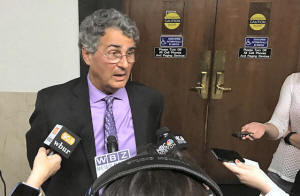|
Massachusetts judge allows right-to-die
lawsuit to move forward
 Send a link to a friend
Send a link to a friend
 [June 06, 2017]
By Nate Raymond [June 06, 2017]
By Nate Raymond
BOSTON (Reuters) - A Massachusetts judge
ruled that two doctors may move forward with a lawsuit seeking an order
that the state's murder and manslaughter laws do not apply to physicians
who offer lethal medications to terminally ill patients.
Superior Court Judge Mary Ames in Boston in a ruling last week declined
to dismiss the lawsuit by the doctors, one of whom is suffering from
cancer, who argued a cloud of uncertainty was preventing physicians from
providing such medications.
The doctors have proven there is a controversy regarding the law that is
worth the court's time to consider, Ames said in the decision, noting
that she had not yet made a determination on the merits of their
argument.
The lawsuit aims to include Massachusetts among states such as Oregon,
Washington, Vermont, California and Colorado and the District of
Columbia that allow physicians to provide aid in dying, according to
right-to-die advocates.
The Massachusetts ruling was in response to a lawsuit by Roger Kligler,
a retired doctor diagnosed with stage-four prostate cancer, and Alan
Steinbach, a physician who says he is willing to write prescriptions for
lethal medication but fears prosecution.

The lawsuit seeks a ruling holding that manslaughter charges cannot be
applied to physicians who write a prescription to terminally ill
competent adults who request medication that they could choose to
self-administer to aid in their death.
"We are pleased with the court's decision because it will allow our
clients to challenge the constitutionality of the law without having to
take actions that could risk prosecution by an aggressive district
attorney," said John Kappos, a lawyer for the plaintiffs, said in a
statement.
[to top of second column] |

Retired Massachusetts physician Roger Kligler, a plaintiff in a
right-to-die lawsuit, speaks to reporters outside a courtroom in
Suffolk County Superior Court in Boston, Massachusetts, U.S., on
March 8, 2017. REUTERS/Nate Raymond/File Photo

A spokeswoman for Massachusetts Attorney General Maura Healey, who
was named as a defendant along with the Cape and Islands County
district attorney and is defending the case, declined to comment.
Healey's office had in court argued the court should defer to the
state legislature to decide the issue and ensure safeguards are
enacted to protect vulnerable patients and the integrity of the
medical community.
The lawsuit is being pursued by nonprofit right-to-die organization
Compassion & Choices.
The Massachusetts legislature has considered, but never enacted,
legislation to allow physicians to provide aid in dying. In 2012,
voters narrowly defeated a ballot initiative that would have
legalized the practice.
(Reporting by Nate Raymond; Editing by Scott Malone and Andrew Hay)
[© 2017 Thomson Reuters. All rights
reserved.]
Copyright 2017 Reuters. All rights reserved. This material may not be published,
broadcast, rewritten or redistributed. |